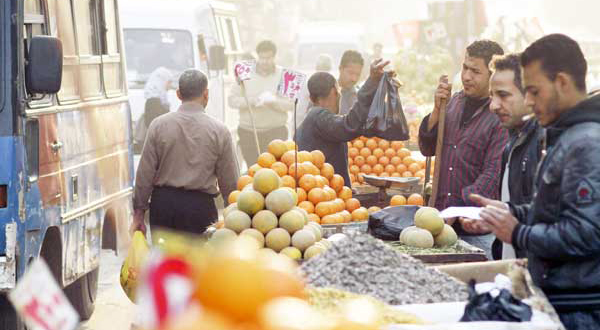 CAIRO: Urban consumer inflation in Egypt accelerated to 12.1 percent in April, its highest in a year, on the back of soaring food prices which contributed to the mass protests that toppled President Hosni Mubarak earlier this year.
CAIRO: Urban consumer inflation in Egypt accelerated to 12.1 percent in April, its highest in a year, on the back of soaring food prices which contributed to the mass protests that toppled President Hosni Mubarak earlier this year.
Egypt inflation jumps to a year high on food prices
By-Sherine El Madany-Reuters
Home News
00:05
Thursday ,12 May 2011

Inflation hit its highest level since March 2010 and was up from 11.5 percent year-on-year in March. On a monthly basis, prices increased 1.2 percent in April.
Several economists had expected an increase in the rate — the most closely watched indicator of prices — as a result of a weaker pound, higher oil prices and imported inflation.
"The headline (rate) stays high because the currency is weak and commodities are still expensive in spite of the recent correction," said Liz Martins, economist at HSBC Middle East.
Analysts say they expect the central bank to keep interest rates steady in June to support an economy reeling from the impact of the popular revolt. Raising rates to combat food-driven inflation would have a limited or no effect on overall prices.
Martins said inflation was not demand driven anymore and "a hike won't bring down the price of bread."
Food and beverage prices, which account for 44 percent of the weighting of the basket Egypt uses to measure inflation, accelerated to 21 percent in the year to April, from 20.5 percent in March.
Egypt, which relies on imports for at least half of its domestic consumption, could suffer further food price inflation after the UN Food and Agriculture Organization said concerns over Chinese and US winter crops could push global food prices higher while global production lags rising demand.
Beltone Financial forecast inflation would average 11.2 percent in the fiscal year to the end of June and further rise to an average of 13.8 percent in the following year, mainly driven by rising global food prices and currency depreciation.
Economic slowdown
Anti-government protests fuelled by soaring prices, unemployment and demands for democratic reforms brought much of Egypt's economy to a standstill for nearly three weeks until Mubarak resigned on Feb. 11.
A collapse in tourism and foreign investment following the political turmoil has hit revenues hard and economists forecast the economy of the most populous Arab country contracted 7 percent in January-March from the previous quarter.
Egypt's central bank kept its key overnight interest rates steady on April 28 in a bid to foster economic growth without reigniting high inflation.
It said the political shakeup would continue to affect consumption and investment, "adversely weighing" on the economy, while global recovery was uncertain due to higher international oil prices amid political unrest in the region.
The International Monetary Fund projects Egypt's economic growth to plunge to 1.0 percent this year after a 5.1 percent expansion in 2010.
Egypt's finance minister has estimated that the political turmoil would reduce economic growth to 2.5-3 percent in the financial year to end-June from the government's previous forecast of 6 percent. –Additional reporting by Mohamed Samir


